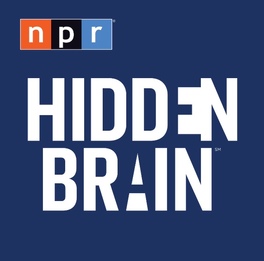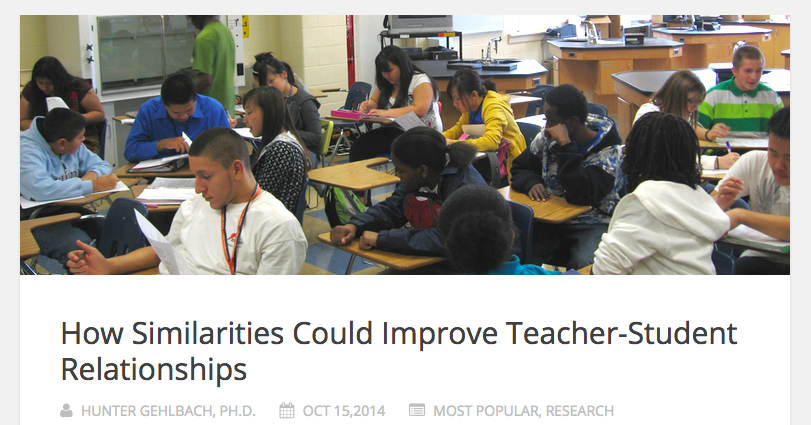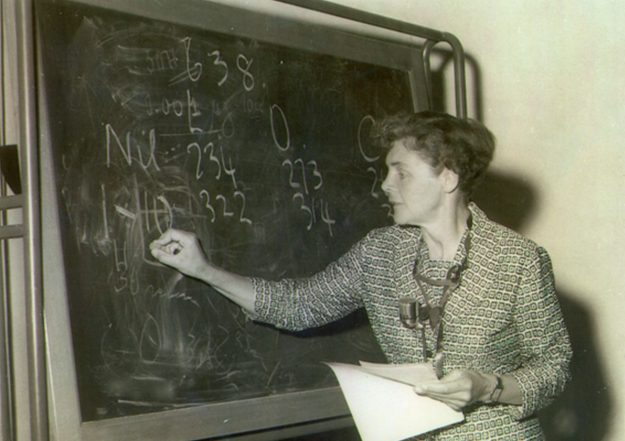A thoughtful study for all the right reasons To start off my blog today, I'd like to ask any educator reading this post to think of some of their hard to reach students, the ones who may be disengaged and performing below expectations in your subject area. Whatever it is you teach, I ask you to really reflect upon these struggling students and keep them in mind as you read further. As educators, we all strive to have a positive, lasting impact on the students that we teach. However, there is a lot involved in this process and by no means is it an easy task. It is common to see massive differences in the abilities and skills of our students in regards to the learning outcomes that they are expected to meet in our programs. How we address these differences requires us to highly personalize our delivery in order to maximize the impact that we can have on student learning which means that the relationships formed with them truly matters. I'm saying something here that seems sooooo obvious, but when we really begin to dissect the relationships that we form with our students, what are some of the factors that matter the most? When looking back at our own experiences in school, what is it that we remember most? Do we remember the different units we studied, essays we were told to write, or passing/failing grades? I barely remember any of these things. What I recall the most is the connections that I had with my teachers and how these connections made me feel. There were some teachers who had no idea who I was as a person, what I thought or how I felt. They didn't know anything about my likes or dislikes and certainly weren't interested in investing the time or energy to find out. I'm certainly not crying 'poor me' here as I know every single teacher reading this blog has very similar experiences in regards to the relationships and connections that they had with their teachers. I was lucky to have some excellent teachers in my time, ones who made me want to learn and show up consistently. I wasn't an A student across the board, but definitely did well in their classes. I'm an avid listener of podcasts and recently came across a great episode in the Hidden Brain NPR show. I've been listening to the Hidden Brain the last few months and always find takeaway value that can be applied to the work that I do. The host, Shankar Vedantum, did one show on the impact of student-teacher relationships on learning and shared a very thoughtful study on this theme carried out by Dr. Hunter Gehlbach and his team of researchers at the Harvard Graduate School of Education.
Let me state that this was just one study in one school and was focused on adolescents at the year 9 level, so it is impossible to make sweeping generalizations that profess absolute truth. It is critical to not blindly take studies such as this at face value. However in saying this, I'd like to challenge you to consider the research and think about to what extent there are shreds of truth within it. The Study at a Glimpse: Dr. Hunter and his group created "get-to-know-you" surveys aimed at identifying personal preferences such as favorite hobbies, charities you would support, characteristics of a good friend, and other types of questions that help to better understand both teachers and students. These surveys were given to 315 ninth grade students and 25 teachers. The research team had a deep look at these surveys which allowed them to really dig deep with identifying potential similarities between the students and their teachers. A week after the surveys were given, both students and teachers were split up into 4 different groups. 1) No feedback from the surveys given to either the teachers or the students. 2) Feedback from surveys given to only the teachers. 3) Feedback from surveys given to only the students. 4) Feedback given to both the students and the teachers. Both students and teachers from group 4 were informed of certain similarities that they had in common with one another. At the end of the term, grades were gathered and researchers came to the conclusion that there was a 60% decrease in the achievement gap between the under-served and over-served when compared to the other study groups. In this case, the under-served were considered to be Black and Latino students. The analyses of this study draws attention to the idea that if there is a stronger connection between student and teacher, the historically under-served will perform better in the classroom. Again, this is just one study in one school with one group of students. It is impossible to assume that the findings are accurate and if the intervention actually works in different school settings across all subject areas. What interests me is the idea of the under-served and over-served. Who are the under-served in your program? In looking at my own subject area of physical education, are the under-served the students who are unfit, not athletic, disengaged and on the fringes? What would happen if I was to conduct a survey with my own students at the beginning of the year that assisted me in narrowing in on similarities between myself and my students. Will knowing these similarities impact the relationships that I have with my students? Conversely, how will my students be impacted by knowing these similarities? Will these similarities serve as an entry point to build upon and strengthen the connection that I have with each of my students? Let's extend it even further and think about how a similar study might even benefit levels of productivity in the workplace in regards to administrator-teacher and teacher-teacher relationships? Will knowing one another better help us to have higher levels of well-being that ultimately impacts the effectiveness of our teaching? Despite not being able to draw firm conclusions from Dr. Hunter's research, at minimum I think that this study should get us thinking about the relationships that we have with our students and what can be done to better connect with them in an effort to maximize the impact that we can potentially have on their learning. I personally think that it is worth the effort and time. What do you think? Thanks for reading.
7 Comments
How prepared are you to be wrong?We are told all the time that the very best teachers are lifelong learners who are always willing to take risk to deepen their understanding of the world around them. But what does this really mean? What does taking a risk actually look like when it comes to continuing to grow, learn, and develop our practice? How do we justify the philosophies and theories that we hold? In what ways do the approaches we use change to reflect continued learning and growth? In deepening our teaching and/or leadership practice, are we willing to ask the hard questions that it takes to push us forward? In a great Ted Talk, Margaret Heffernan shares some research that suggests that we are hard wired to organize ourselves and our learning by surrounding ourselves with people and information that reinforces our own opinions rather than challenging them. Margaret believes it is essential to align ourselves with people who are not just echo chambers telling us what we want to hear, but to actively seek opposition. To illustrate this point, she shares the story of an amazing physician named Dr. Alice Mary Stuart, who was also known as the ‘woman who knew too much’. I first heard about this story from my friend Marina Gijzen, the elementary principal at the Nanjing International School. I revisited this story recently as I have been exploring what good leadership means. Alice was a physician and epidemiologist specialising in social medicine and the effects of radiation on health. She identified a major problem in the 1950s when she noticed that the incidence of childhood cancers were beginning to spike. Upon looking at the statistics, she observed that this spike was indeed a reality and made it her life’s work to figure out what was happening. She painstakingly created survey after survey interviewing the parents of children who were stricken with cancer in an effort to determine the root cause. She interviewed countless mothers in detail over a period of several years and although she did not really know what she was looking for, something glaringly obvious popped out at her during her investigation. She was able to determine that mothers of children who had died from cancer had had x-rays taken of them during their pregnancy. This was the 1950s and the x-ray machine was a major technological breakthrough. The medical professional was celebrating this new invention and Dr. Alice's finding flew in the face of conventional wisdom at the time. Nobody wanted to know this information and X-rays continued on, so Dr. Alice embarked on 25 years of continued research to further address this problem in an attempt to ban the X-raying of pregnant women. To prove beyond a shadow of a doubt that it was these x-ray machines that were the root cause of the spike in childhood cancers, she had to align herself with people who would challenge her theory…. Enter Dr. George Kneale.
Alice actively sought out someone who was completely different than her in every way imaginable. Dr. George was a statistician and numbers cruncher who was extremely introverted which was in stark contrast to the extraverted Alice. He was a recluse who preferred numbers over people. She hired him so that his number one job was to actively disconfirm her findings and to disprove her models of work. She demanded that he find her wrong because this was the only way that she could refine her work to the point that she had the evidence that she needed to move forward and convince the medical profession of the damage being caused by the x-rays. It was through this very unique partnership that both Alice and George deeply developed their understanding of the work that they do and after 25 years, through great turbulence and conflict, Alice had resounding proof that the X-rays being given to woman during their pregnancies was the root cause of these childhood cancers. It was in the 1970s that the UK government finally listened and made it law that women could no longer be X-rayed during their pregnancies ultimately putting a stop to childhood cancers related to radiation exposure while in utero. The main reason for this was the collaboration between Dr. Alice Stuart and Dr. George Kneale, despite their very different viewpoints and perspectives. I share this story because the lessons learned from the Alice Mary Stuart story are so applicable to our growth as teachers and leaders. It is very easy to fall into the trap of routine and methodical thinking about what we feel is right. Whether it be teaching students in the classroom or being a leader within an organization, our views, opinions, theories, and ideas are not bullet proof. In an effort to refine our approach and better understand why we do what we do, we must remain open to being wrong. Our continued growth is dependent upon having a sound structure to the way we collaborate in regards to the work that we do. We must continually strengthen our capacity to develop relationships with people that are very different than us, especially when it comes to challenging the beliefs we hold about the work that we do. And when we find that we’ve made mistakes and that perhaps some of the approaches/ideas that we are putting into practice are wrong, we need to accept these moments as holding the insight needed to help make the change necessary for continued growth and learning. When I look at my own work, I put a massive emphasis on the power of reflection and addressing the affective domain whenever possible with the students that I teach and the educators that I train. I cannot blindly accept that my way is right, but must challenge myself, and connect with others who will challenge the work I do. I’ve had great discussions recently with a number of researchers/practitioners who continue to challenge the beliefs that I hold and the approaches that I use. And I too challenge them to better understand their work. It’s the insight gained from these exchanges that helps me to assess how accurate my own views are and the next steps needed for me to change what I do in order to better my own practice. I’d like you to reflect on who you surround yourselves with and the role that these people play in helping you to become better at what you do. How often is your work challenged? How do you accept these challenges? How have these challenges helped you to better your best and continue to deepen the work that you do? Care to share? Please comment below! Thanks for reading. |
AuthorKAUST Faculty, Pedagogical Coach. Presenter & Workshop Leader.IB Educator. #RunYourLife podcast host. Archives
September 2022
|
- Welcome
- All Things Teaching and Learning
- The Aligned Leader Blog
- Consulting and Coaching Opportunities
- My TED X Talk
- My Leadership Blog
- Run Your Life Podcast Series
- How PYP PE with Andy Has Helped Others
- Good Teaching is L.I.F.E
- The Sportfolio
- Example Assessment Tasks
- PYP Attitude Posters (printable)
- Publications


 RSS Feed
RSS Feed
